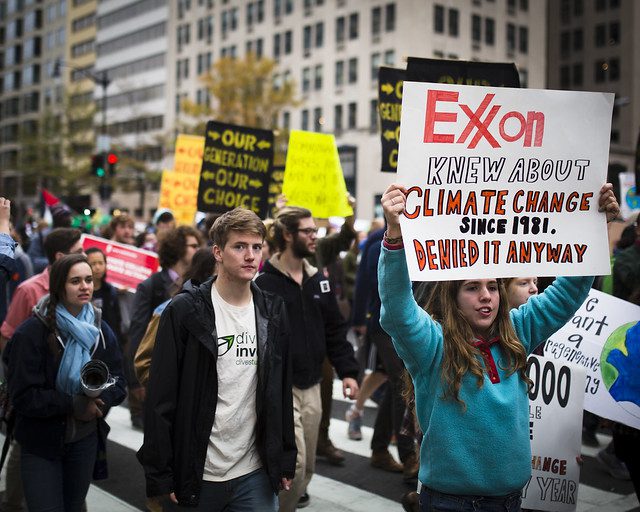


Care2: Our planet is losing species at a rate faster than any time since the dinosaurs were wiped off the face of the earth 65 million years ago. And yet in the face of this extinction crisis, Republicans in the U.S. Congress are working to dismantle the law that gives species on the brink a fighting chance. In the last 10 years, more than 300 bills have been introduced that take aim at the Endangered Species Act (ESA), the vast majority by Republican legislators. They’ve attempted to limit authorities from listing new endangered species based on the economic costs of protecting that given species, and whether or not it is native to the U.S. They’ve even tried to force wildlife experts to get Congress’s permission for every single listing decision. The ESA is an environmental success story. It’s helped save wolves, crocodiles, whooping cranes and many more species from annihilation. In the face of climate change and human development putting more species at risk, we need to strengthen—not weaken—every tool we have to fight back.
>>>Urge Republican lawmakers to oppose any bill that weakens the Endangered Species Act.
Pacific Environment: Our oceans are drowning in plastic. Around the world, it suffocates sea turtles, starves seabirds, destroys marine habitat, and clogs local rivers. In fact, we’re on track to have more plastic than fish in the world’s oceans. Zero waste grassroots campaigners have promoted the concept of zero waste in Vietnam, which helped inspire Vietnam’s prime minister to commit to banning single-use plastic nationwide by 2025. But if we’re going to win the battle against the plastic pollution crisis, we have to fight it at home, too. The U.S. produces more waste per person than any other country in the world, and instead of working to stem the tide of pollution, American plastic manufacturers want to dramatically increase production over the next decade. Over 270 organizations from across the country are demanding the U.S. Environmental Protection Agency do its job and stop Big Plastic from polluting our oceans and communities.
>>>Urge the EPA to protect communities and oceans from the rising tide of plastic pollution.
Fur Free Minneapolis: The fur trade is a brutal industry where millions of animals such as foxes, minks, rabbits, dogs, cats, raccoons, and chinchillas are killed every year. Most of these animals are raised on fur farms, where they are confined to a life of misery in cages that are barely bigger than their bodies. They live through intense stress and engage in psychotic behaviors like repetitive pacing, self-mutilation and cannibalism. These animals endure this life only to be killed in some of the most inhumane ways. They are electrocuted and stunned, and some are still alive as they are beaten and skinned. They are submitted to this suffering solely for the sake of their fur. Fur farms pollute our water systems with phosphorus, causing algae to grow faster than ecosystems can handle, which in turn leads to the death of fish and plants and reduces the use of the water for human purposes such as consumption and swimming. Fur farms also use at least four times the amount of resources (water and feed) as farms producing plant-based fabrics. In this day of countless eco and animal-friendly fabrics, there is no need for this violent industry.
>>>Urge the Minneapolis City Council to pass an ordinance that bans the sale of new fur products within the city.
Cause for concern…

- Judge says ExxonMobil can’t pressure witnesses in climate fraud case (Nicholas Kusnetz, InsideClimate News)
- World food crisis looms if carbon emissions go unchecked, warns U.N., calling for reduction of meat consumption (Stephen Leahy, National Geographic)
- Slaughtered animals and the people slaughtering them represent some of the most marginalized groups in our society (Encompass)
- Toxins from algae outbreaks plague hundreds of lakes in 48 states: new report (Environmental Working Group)
- African swine fever threatens 200 million pigs in China (The Economist)
- It would take 50 million years to recover New Zealand’s lost bird species (Cell Press)
- Ocean temperature ‘surprises’ becoming more common (Gulf of Maine Research Institute)
Round of applause…

- Cows are good therapists, even though they don’t say a word (Elisa Mala, The New York Times)
- After nearly 24,000 people signed a petition to halt Florida’s iguana massacre, the state rescinded its call for the public to kill them (Katie Valentine, Lady Freethinker)
- McDonald’s may introduce its own meatless burger in the company’s U.S.-based restaurants (Inc.)
- Subway is launching a vegan sub with Beyond Meat (Compassion Over Killing)
- Study finds organic apples have a more diverse and balanced bacterial community than conventional apples (The Organic & Non-GMO Report)
EFL in the news…
Sriram Madhusoodanan, climate campaign director for Corporate Accountability, recently discussed an EFL op-ed, Current Investigation of ExxonMobil Could Spur Broader Climate Action, by Corporate Accountability’s executive director Patti Lynn, in a radio interview with FAIR’s Janine Jackson for CounterSpin, FAIR’s radio show. [LISTEN]
Parting thought…
“Not a single creature on Earth has more or less right to be here.” —Anthony Douglas Williams